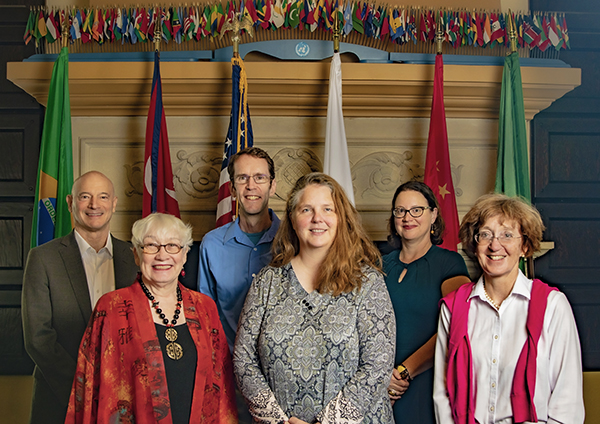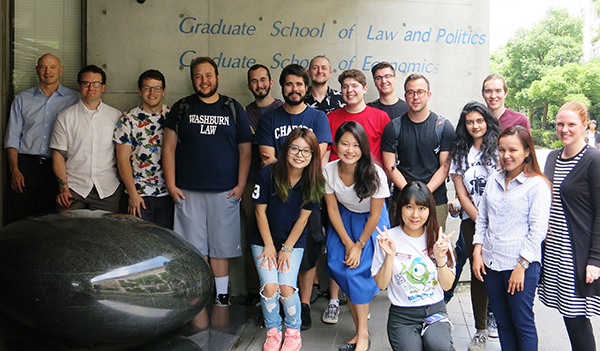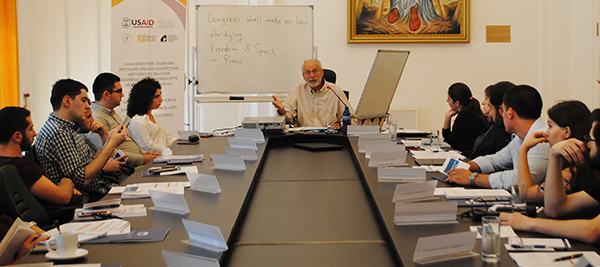International and Comparative Law Center
Faculty, Center work to connect Kansas students to international law practices

(Law faculty who work on international law: Front row (left) Linda Elrod, BA ’69, JD ’72, Lori McMillan, Amy Deen Westbrook. Back row (Left) Craig Martin, Alex Glashausser, Antonina Kowalska. Photo by Jeremy Wangler)
From Washburn Lawyer - 2021-22
By Angela Lutz
When Washburn University School of Law Distinguished Professor Linda Elrod, BA ’69, JD ’72, traveled to Copenhagen, Denmark, as a Washburn undergraduate in 1967, she experienced what she called “an awakening.” During her journey, she visited more than 15 countries and came to understand how foreign legal systems could inform her point of view on family law. As a professor, she returned to Denmark more than a decade later, solidifying her drive to bring a well-rounded global perspective to her students.
“That’s what sparked my interest – the idea that America didn’t have all the answers, and other countries were sometimes doing things a little better than we were,” Elrod said. “I realized our law students needed to have a broader base of understanding of the world, the way other systems are operating, and how governments and other players function within those systems.”
During more than four decades teaching at Washburn, Elrod has established herself as an international family law expert. She has coauthored a widely used textbook and given more than 170 presentations at local, national, and international events. She has spoken and taught all over the world – including Australia, Canada, England, France, Ireland, the Netherlands, New Zealand, and Serbia. She has also helped draft international child support conventions, and she serves on the Advisory Committee of Private International Law.
“We’re all global citizens at this point,” she said. “We all need to be aware of international norms.”
International and Comparative Law Scholarship
At Washburn, Elrod is one of many professors who actively present, teach, and publish around the world, bolstering the law school’s reputation and passing knowledge and experience on to its students. One of the most vital aspects of Washburn’s global presence is legal scholarship, which showcases the vast proficiency of the law school’s faculty.
“To most people, scholarship is not a very visible aspect of what we do, but it’s very important,” said Professor Craig Martin, the co-director of the International and Comparative Law Center. “From an international and comparative law perspective, we have a disproportionate number of faculty who are writing cutting-edge scholarship and making a name for themselves.”
One of Washburn’s most prolific scholars is Freddy Sourgens, Senator Robert J. Dole distinguished professor and director of the Oil and Gas Law Center. He has coauthored multiple books on subjects including international petroleum law and evidence in international investment arbitration, international law theory, climate change law, among many others, and he is currently working on another title about renewable energy and transnational law. He has more than 80 international publications to his name, making him a globally recognized authority on the intersection between energy law, dispute resolution, transnational law, and globalization.
“I think comparative law provides students with a better toolkit so they can ask questions that sharpen their understanding in a more sophisticated way,” Sourgens said. “Many of the largest problems we have at the moment are global problems, and they’re subject to global regulatory processes. Having
this knowledge is an important part of being a lawyer in
the 21st century.”
Sourgens and Elrod are among a strong bench of international and comparative law scholars at Washburn Law, a list that includes Professors Amy Westbrook, who focuses on international trade and international business transactions; Patricia Judd, who specializes in international intellectual property law; Lori McMillan, who works in international and comparative tax law; Antonina Kowalska, who works on comparative legal education, and Alex Glashausser, who has published on comparative civil procedure and jurisdictional issues. Craig Martin, the co-director of the ICLC, teaches public international law, the law of armed conflict, international human rights, international climate change law, and comparative constitutional law. His scholarship focuses on the legal constraints on the use of force and armed conflict in both international and constitutional law, and he has written extensively on Japanese constitutional war powers. He recently started a podcast in which he interviews top experts from around the world on legal issues related to the laws of war, and which is now listened to in over 100 countries (visit it at: jibjabpodcast.com).
As with Elrod, Sourgens, Martin, and others travel all over the world to present their scholarship at international and comparative law conferences. Again, this is activity that tends to be out of sight of students, staff, and alumni, but it is an important component of the work that they do. As Martin explained, “the overall purpose of scholarship is ultimately to advance our collective understanding of law and policy, but as a scholar, one of course wants to exercise some influence on the development of that collective understanding, to shape the formation of future law and policy, whether here or abroad – and to exercise influence your scholarship has to be read by many people, in many different positions in the process of law and policy formation. Presenting at conferences is a way for us to get our writing read and discussed – and also an opportunity for us to get feedback on our work, and to get more and better ideas for future work. It is our opportunity to really engage in the marketplace of ideas and amplify our own contributions to that marketplace.”
The International and Comparative Law Center
Martin and Kowalska, who administers much of the study abroad program, sought in 2013 to establish an institution that could coordinate and facilitate the international and comparative law curriculum, programs, and scholarship at the law school. This led to the establishment of the ICLC. It became one of Washburn’s six centers for excellence that provide an organizational structure focusing on a particular area of law or aspect of legal practice. Martin and Kowalska serve as co-directors of the center, which has the mission of both coordinating and furthering the education of Washburn Law students in the area of international and comparative law, and to support and promote the scholarship, teaching, and service of the Washburn Law faculty in international and comparative law.
“We established the International and Comparative Law Center because we had more international and comparative law faculty members than other schools in the region, and most schools of our size,” Martin said, “and so it made sense to both play to our strengths and leverage our comparative advantage, and to help promote the international and comparative law work of our faculty. But also, there was a broad understanding that some familiarity with international and comparative law is increasingly important in our ever globalized world, and it would be irresponsible not to properly prepare our students for careers in that world. The ICLC was established in part to focus on that need.”
“Some people may wonder why a lawyer in Kansas or Missouri might need to know either international or foreign law, but the reality is Kansas is involved in energy production, agriculture, aeronautics, and any number of other industries that involve global markets – there are many more international implications than one might think,” Martin said. “Coming to Washburn, you have the opportunity to do global work if that’s where your interests lie.”

(Professor Craig Martin and students from both Washburn Law and Osaka University, at Osaka University, June 2018. Photo submitted)
Washburn’s prominence in the field of international and comparative law also helps attract new students, who are increasingly interested in how their legal careers and influence can span the globe. In addition to Washburn Law offering a robust selection of international and comparative law courses, the ICLC administers study abroad programs in Barbados; Osaka, Japan; and Maastricht in The Netherlands, all of which provide students with an opportunity to study alongside foreign students, and expose them to very different perspectives.
The ICLC is currently fundraising to help students who cannot afford to participate in these study abroad programs, as well as to create internships, externships, and a pipeline for jobs abroad or in international organizations.
The ICLC also established an annual Great Plains International and Comparative Law Colloquium, a one-day workshop at which scholars from law schools in the region can meet to present and discuss their current research and writing projects.
Supporting the Rule of Law in Georgia

(Professor Bill Rich teaching constitutional law in the Constitutional Court of Georgia, in Batumi, on the Black Sea, 2019. Photo submitted)
Another important international program that Washburn Law faculty and students have contributed to is a rule of law initiative in the Republic of Georgia (now simply known as Georgia). The program was established at Washburn in 2011, when the Law School received a grant from the United States Department of State Agency for International Development to help promote the rule of law, and Washburn partnered with Georgia’s Free University of Tbilisi.
More than half of Washburn Law faculty members have been involved in teaching courses to students in Georgia, as well as running workshops for the training of Georgian university professors, lawyers, and even judges. Washburn Law students have played an important role as well, conducting research each year in a program that has been overseen by Professors Jeff Jackson and Bill Rich. “Washburn students are selected to write research memos that will be used in amicus briefs in the constitutional court of Georgia,” said Professor Craig Martin. “Some of our students’ memos have been cited in court decisions on constitutional issues. It’s pretty exciting for them to know that their research is going to be relied upon in court.”
For more on the ICLC and the international and comparative law activity of Washburn Law faculty and students, visit the ICLC webpage: washburnlaw.edu/practicalexperience/internationallaw